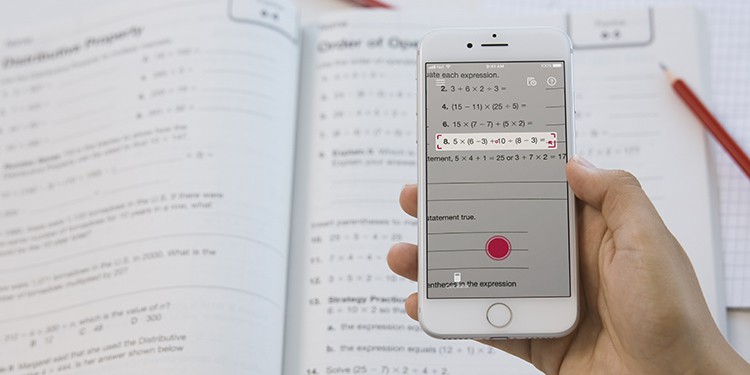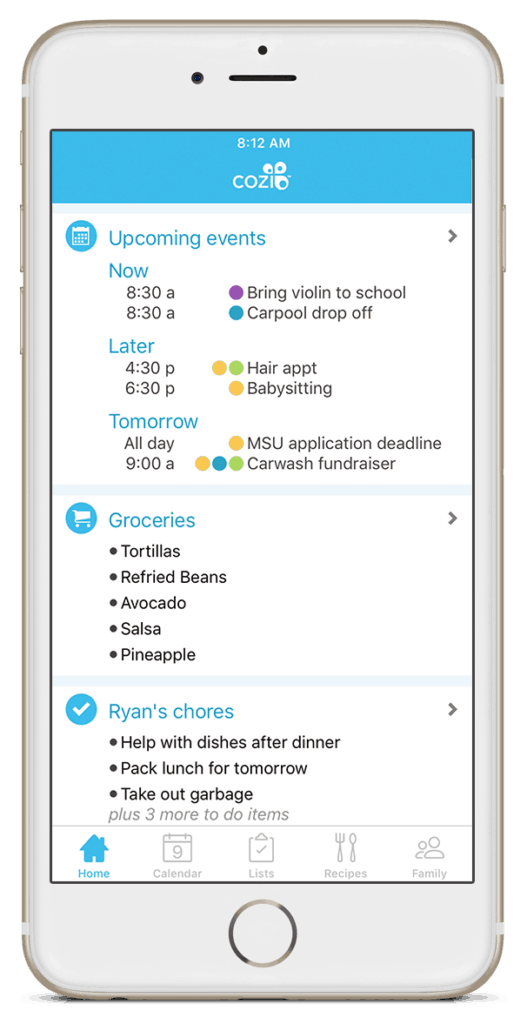
Better parenting through smartphones? That’s the claim of a new generation of family-friendly apps, which promise to improve the way you do everything from math homework to grocery shopping. But which are worth the download?
If it seems like you and every parent you see spend most of your waking hours with your face in a smartphone, it’s not a figment of your imagination.
According to a recent Common Sense Media report, parents of kids ages 8 to 18 spend nearly nine hours of their day consuming “screen media,” which includes everything from playing video games to scrolling Facebook and Twitter, plus interacting with apps.
Most of us don’t need to be told this is not the most productive way to spend our time, but what if some of those screen hours could actually make us better parents? More patient, more organized and perhaps even better at math? That’s precisely the promise of three popular parenting-oriented apps recommended by multiple blogs and national newspapers. We had to wonder, does their usefulness stand up to their claims? Are the benefits worth the extra screen time? We used each one for a month to find out.
Cozi Family Organizer
Free for basic version, $29.99/year to unlock all features. Apple/Google Play.
The claim: “The surprisingly simple family organizer/You’ll wonder how you managed life before Cozi.” Tech website CNET calls it the “best app you’ve never tried” — a shareable, color-coded calendar that provides your entire family’s to-do lists and activities at a glance.
While not a parenting app per se, Cozi was clearly designed with parents in mind, trumpeting its status as a “3-time Mom’s Choice Award Winner” and serving as a sort of organizational clearinghouse for everything from grocery and contact lists to school and sports schedules.

“Wow, I thought this was actually going to suck!” shouted my husband from the next room, after downloading Cozi (family accounts are linked) and familiarizing himself with the surprisingly long list of features, including integration with Google Calendar and the option to receive an email every day at 5 am with that day’s schedule and to-do list.
Unlike many organizational apps, Cozi’s free version is perfectly serviceable, with the ability to maintain a calendar with color-coded events for each family member, multiple grocery lists (additions to which can be set as alerts on a family member’s phone), recipes and to-do agendas.
The “Gold” paid version allows for the user to view calendars by month (instead of only by week) and search for specific events, as well as build a shareable address book, features which, after consistent use of the app, I found worth the $29.99. It also offers optional seasonal add-ons, which in January included a 31-day plan to “conquer clutter,” a family mission starter list, and 30 recommended tasks for January, which included “order batteries online,” “buy a year’s worth of birthday cards and stamps,” and “paint that room (you know the one).”
In terms of usefulness, Cozi blew our current household organizational system — a hodgepodge of Google Calendar, a Cornell Lab of Ornithology promotional calendar tacked to the inside of our pantry, and frequently misplaced Post-it notes — out of the water. As is the case for many type-A moms, most of the emotional labor involved with keeping organized — remembering when library books and homework are due, knowing friends’ and family members’ birthdays, maintaining shopping and contact lists — falls to me. With Cozi, my husband can now share the burden. He now has access to all of the same information I do (and, most importantly, he knows that I know that he does), and gets automatic alerts on his phone when, say, we’re out of bananas or swim class is canceled for the day.
We also now have ongoing shared lists for Costco, Trader Joe’s, Amazon and Home Depot (the other person is notified when items are added), as well as alerts for when library books, bills and homework projects are due, so excuses like “I didn’t know” and “I forgot” — from either of us — are about as believable as a child who cleans their room the first time they’re asked. I do know how I managed family life before Cozi: poorly.
Would recommend to a friend: Yes.
Bright Parenting
Free version with limited access, $4.99/month or $39.99/year unlocks all content. Apple/Google Play.
The claim: “Discover the great parent in you! Better parenting in just 2 minutes a day.” Personalized and evidence-based lessons for parenting kids ages 2 to 10 sent via push notifications to your smartphone.
The premise of Bright Parenting is undeniably appealing to most busy caregivers: Why wade through dozens of books and in-person classes when you could receive a distillation of expert parenting advice each day, right on your phone, at a time you’ve chosen? Somewhat like Duolingo, the well-known language-learning app, Bright offers a library of topics from which one can choose à la carte and then complete (for me, mother of a 7-year-old boy, the app — accurately — recommended lessons such as “Why Kids Whine,” “Why Kids are Disrespectful,” and “Getting Kids to Listen”), as well as a Daily Practice: a shorter, seasonally relevant lesson targeted to your kids’ ages.
I excitedly downloaded Bright, identified by an orange “B” icon, scrolled through the orientation and recommended lessons (many of which I promptly forgot) and chose 10:45 am to receive my alerts, thinking it would be a good time each day to take a break from work.
This was, I would later come to discover, a big mistake.
Like most working parents, I am inundated nearly 24 hours a day with emails, texts and app alerts, and one more notification needing my attention — which, as it turned out, was not always relevant to my current parenting struggle(s) — during working hours just about upset the applecart.
A few weeks after downloading the app, I was simultaneously holiday shopping at Fred Meyer, checking work emails, and texting one of my son’s friend’s parents about a playdate when the dreaded Bright text message-like alert popped up on my phone. “Want easy holiday fun?” the header announced cheerily, punctuated with Christmas tree and scissor emojis. “Try this craft with your kid!” Deeply annoyed, I clicked through to discover Bright was suggesting tracing and cutting 25 hands out of green construction paper and gluing them onto cardstock to make a wreath. This was the last straw. I needed a glass of wine just thinking about guiding my constantly active 7-year-old through an afternoon of draconian preschool busywork.
Unfortunately, this was a near-daily occurrence with Bright installed on my phone; I was never not annoyed to see the alert. I’m not sure if changing the alert time would’ve helped, either, because when I do have the time, patience and headspace to focus on and absorb parenting advice, I’d rather it be more targeted to something specific I’m struggling with. Like finding more time.
Would recommend to a friend: No.
PhotoMath
Free. Apple/Google Play.
The claim: “Math superpowers for every student.” Read and solve mathematical equations in real time using your smartphone.
At first blush, Photomath sounds like a teacher’s — and parent’s — worst nightmare, as well as something I would have given my life savings to have as a student in the 1980s: a “photo calculator” that takes a picture of a math problem and instantly produces the answer.
The app is almost shockingly simple: Open it and place the adjustable finder window over a math problem. Push the red photo button and voilà — the answer, along with solving steps, appear immediately.
“Is Photomath a cheating tool?” reads an FAQ point on the app’s website. While the answer does acknowledge that “there are optimal methods of using Photomath,” to the app’s credit, each answer comes with step-by-step instructions and sometimes even a video tutorial of how the captured problem was solved. Thankfully, this is extremely relevant to me as a parent to a public-school child using Bridges in Mathematics, the K-5 Common Core curriculum so convoluted to my nearly-40-year-old mind that even the first-grade homework is akin to interpreting ancient runes.
Unfortunately, Photomath isn’t much help with Bridges’ fondness for word problems and games involving pennies and dominoes, but for actual equations, from algebra to calculus, the capture window can be expanded as far as needed vertically or horizontally, and the step-by-step instructions can be a helpful memory jogger for a parent who, say, hasn’t done more than calculate a tip percentage since the Clinton administration. (Not naming names.)
Would recommend to a friend: Yes.
- Local Water Fun Near Portland - August 13, 2023
- There’s No I in Team: How to be a Good Sports Parent - June 22, 2023
- Why Can’t I Get Pregnant Again? - September 29, 2021



